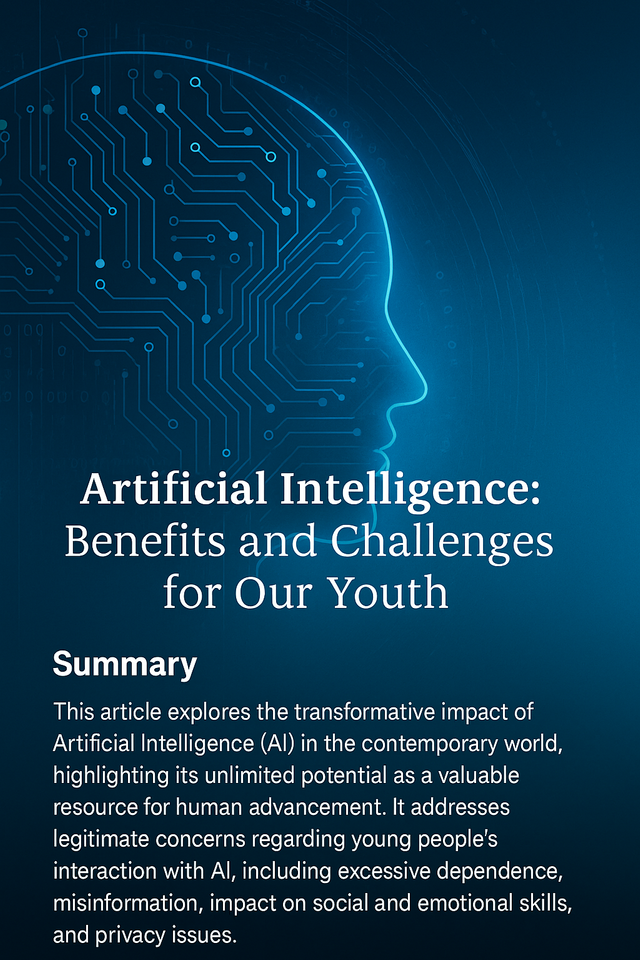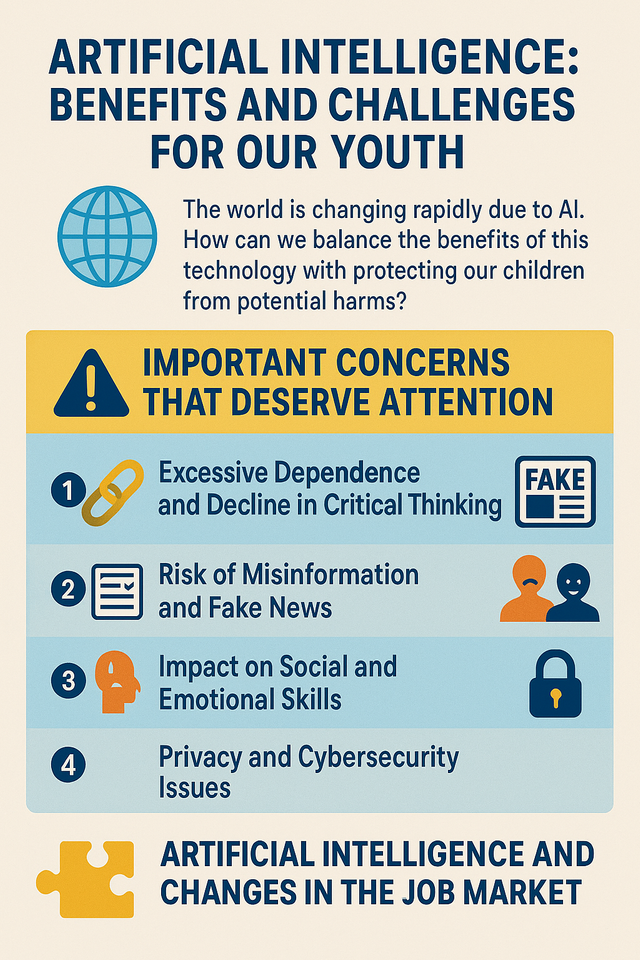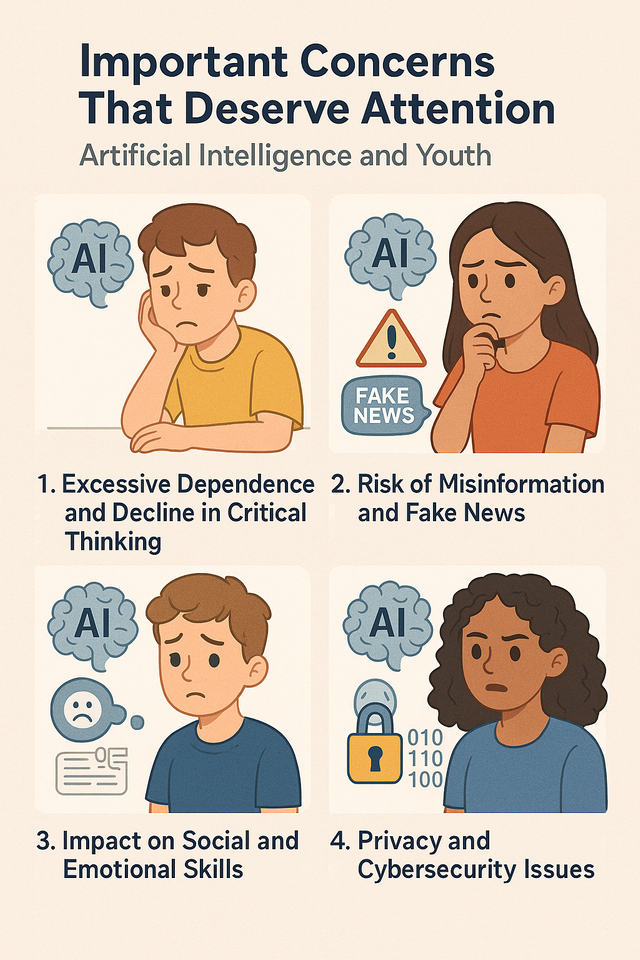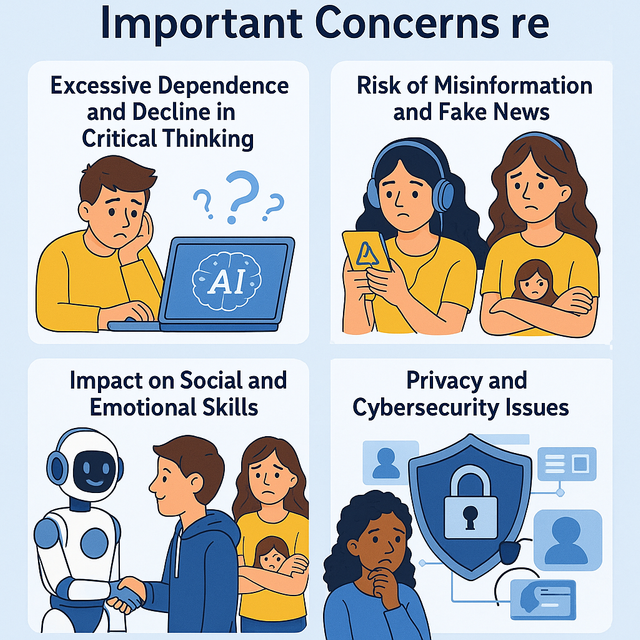Artificial Intelligence: Benefits and Challenges for Our Youth
🧠 Artificial Intelligence: Benefits and Challenges for Our Youth
📌 Summary
This article explores the transformative impact of Artificial Intelligence (AI) in the contemporary world, highlighting its unlimited potential as a valuable resource for human advancement. It addresses legitimate concerns regarding young people's interaction with AI, including excessive dependence, misinformation, impact on social and emotional skills, and privacy issues. The text also discusses the changes in the job market driven by AI and proposes strategies to empower young people to navigate this technological future with awareness and responsibility, emphasizing the importance of unique human skills and continuous learning.
🌐 The World Is Changing
Our world is currently witnessing an unprecedented technological revolution, thanks to Artificial Intelligence (AI). This technology, which offers us an unlimited base of information and solutions, is a true treasure for the advancement of humanity in all areas.
Yes, it promises a more efficient and innovative future—from medicine to education, and even in daily life.
However, with this great opening and growing influence, legitimate and rational concerns arise, especially for our emerging generations of young people.
How can we balance making the most of this powerful tool with protecting our children from some of its potential negative aspects? This is the question on many minds.
⚠️ Important Concerns That Deserve Attention
When it comes to young people's interaction with Artificial Intelligence, there are several points that require reflection and caution to ensure healthy and conscious development:
1. Excessive Dependence and Decline in Critical Thinking
Some young people may become accustomed to extracting all answers and solutions from Artificial Intelligence without the effort of deep thought or independent research. This behavior, if not addressed, can negatively affect their analytical skills, decision-making, and problem-solving abilities on their own—vital skills for success in any area of life.
2. Risk of Misinformation and Fake News
With the ease of generating information and its rapid dissemination, Artificial Intelligence can contribute—intentionally or unintentionally—to the spread of fake news or inaccurate information.
Children or young people may have great difficulty distinguishing truth from falsehood in a vast sea of information, which can form mistaken beliefs and affect their worldview.
3. Impact on Social and Emotional Skills
Some young people may prefer easy and instant interaction with intelligent systems or virtual worlds instead of real human interaction, which requires patience, understanding, and complex social skills.
This tendency can negatively affect the development of their social skills, their ability to build healthy and lasting relationships, and the understanding of diverse human emotions.
4. Privacy and Cybersecurity Issues
Every digital interaction, especially with Artificial Intelligence applications that collect data to improve their services, involves sharing personal information.
Young people, due to their lesser experience and awareness of digital risks, may be more vulnerable to privacy violations, irresponsible use of their personal data, or becoming victims of invasions or exploitation.
🧩 Artificial Intelligence and Changes in the Job Market
There is no doubt that Artificial Intelligence will cause radical changes in the future job market. While it can assist in automating routine tasks and contribute to the creation of new job opportunities, it imposes on young people the need for continuous adaptation.
To prepare our young people for this future, we must:
Focus education on unique human skills:
Such as creativity, critical thinking, complex problem-solving, human communication, and the ability for empathy and cultural understanding.Acquire advanced digital skills:
Not just using Artificial Intelligence tools, but understanding how they work and having the ability to develop them or collaborate with them.Lifelong learning:
Continuous learning and adaptation to technological changes will become essential for success in an ever-evolving job market.
🛡️ The Safe Path: How to Help Our Young People?
This does not mean that we should fear Artificial Intelligence and turn away from it, but rather that we must learn to deal with it with awareness and responsibility. Here comes the role of all of us—parents, educators, and thinkers:
- Continuous Education and Awareness
- Development of Critical Thinking
- Strengthening Authentic Human Skills
- Setting Clear Limits and Rules
✅ Conclusion
Artificial Intelligence is a powerful tool for the future, but its true power lies in how we use it with awareness and responsibility.
With our awareness, care, and cooperation, we can guide our young people to make the most of this technology, protecting them from its potential harms and preparing them for a constantly changing job market.
Let’s build a future where technology serves humanity, and is not its master!
📍 Mohamed Younes
São Paulo - Brazil
📧 moyou1661@gmail.com
🗓️ July 7, 2025
🔑 Keywords:
Artificial Intelligence, Youth, Education, Development, Challenges, Future, Technology, Human Skills, Job Market, Ethics



